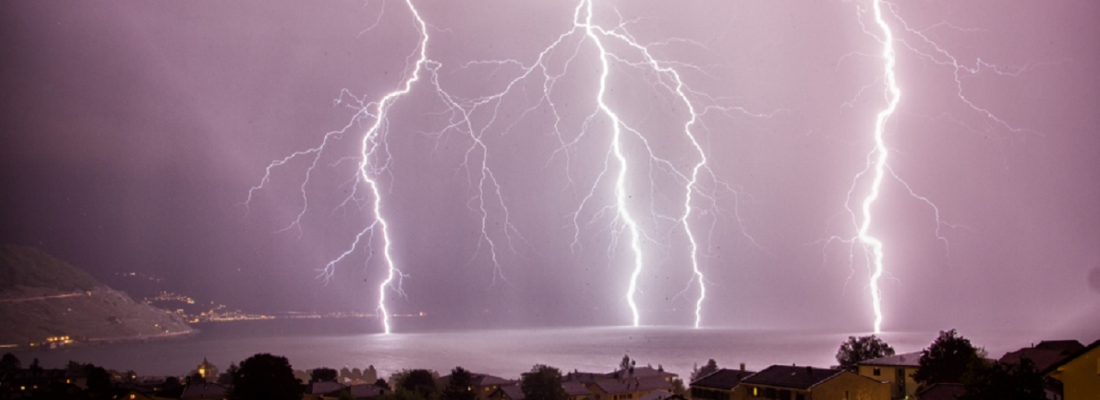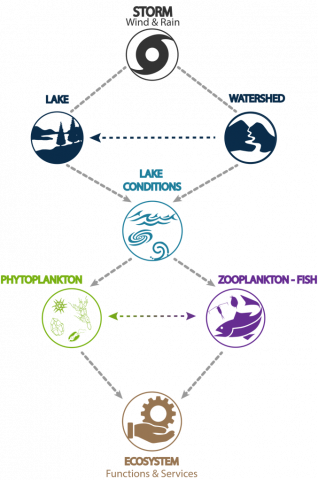Climate change and risks Reading time 3 min
What we don't know (about lakes) could harm us
Published on 04 March 2020

A team of 39 scientists from 20 different countries carried out a comprehensive synthesis study via the Geisha Project, which is jointly funded by the French Foundation for Biodiversity Research's (FRB) Centre for the Synthesis and Analysis of Biodiversity (CESAB), and the US Geological Survey's John Wesley Powell Center for Analysis and Synthesis. They focused on the effects storms have on lakes, particularly on their phytoplankton, i.e. microscopic algae that are the foundation of food webs and one of the factors in water quality regulation. The results of this study were published in the journal Global Change Biology on 5 March 2020.
It is well known that extreme weather events damage property and infrastructures and have an impact on the environment, including on freshwater resources that are essential for human health. Lakes are particularly at risk since they are directly affected by storms and then receive runoff from throughout their catchment areas - water that arrives filled with sediment, nutrients, microplastics and much more.
"We have a good idea of how lakes physically respond to storms: the water column mixes, water temperature changes, and sediments can be churned up from the bottom or delivered by rivers and streams to make the lake more turbid," explained Jason Stockwell, the publication's main author and one of the GEISHA Project's leads. "But the physical response of the lake is just part of the story. The biological impact of storms on phytoplankton and on other plants and animals is fundamental to how lakes behave — and, as our study reveals, poorly understood".
In analysing thousands of scientific articles from around the world, these researchers found that there were very few articles on the effects storms have on lakes and even fewer on phytoplankton. What’s more, the few available findings were contradictory.
How do phytoplankton react to storms? How do their reactions differ by type of storm, lake or time of the year? "If extreme weather events significantly change carbon, nutrient, or energy cycling in lakes, we better figure it out quickly," warned Jason Stockwell. So the scientists are calling for multi-disciplinary collaboration between researchers to develop and advance study in those areas. In particular, they suggested that modelling be used along with expanding long-term lake monitoring programs through networks such as the Global Lake Ecological Observatory Network (GLEON, https://gleon.org).

|
| Storm impact on lakes varies depending on each lake's geographic and morphological features, its physical and chemical conditions, and the properties of its catchment area. Such factors act like filters that either buffer or intensify the effects of storms. The reaction of phytoplankton (microscopic plants at the base of food webs) to a storm has serious repercussions on other food web components and on the ecosystem services the lake provides.
© Gaël Dur |
|
Reference Stockwell, J., J.P. Doubek, R. Adrian, O. Anneville, C.C. Carey, L. Carvalho, L. de Senerpont Domis, G. Dur, M. Frassl, H.-P. Grossart, B. Ibelings, M. Lajeunesse, A. Lewandowska, M. Llames, S.S. Matsuzaki, E. Nodine, P. Noges, V. Patil, F. Pomati, K. Rinke, L. Rudstam, J. Rusak, N. Salmaso, C. Seltmann, D. Straile, S. Thackeray, W. Thiery, P. Urrutia-Cordero, P. Venail, P. Verburg, R. Woolway, T. Zohary, M. Andersen, R. Bhattacharya, J. Hejzlar, N. Janatian Ghadikolaei, T. Kpodonu, T. Williamson, and H. Wilson. Storm impacts on phytoplankton community dynamics in lakes. Global Change Biology. DOI: 10.1111/gcb.15033 |
|
Funding FRB-Cesab, John Wesley Powell Center (U.S. Geological Survey), Vermont Water Resources and Lake Studies Center, U.S. National Science Foundation |
|
Partners University of Vermont (US), Leibniz Institute of Freshwater Ecology and Inland Fisheries (DE), INRAE (FR), Université Savoie Mont Blanc (FR), Virginia Tech (US), Centre for Ecology & Hydrology (UK), Netherlands Institute of Ecology (NL), Shizuoka University (JP), Australian Rivers Institute (AU), Department F.- A. Forel for Environmental and Aquatic Sciences (CH), University of South Florida (US), Tvärminne Zoological Station (FI), Instituto Tecnológico Chascomús (AR), National Institute for Environmental Studies (JP), Rollins College (US), Estonian University of Life Sciences (EE), US Geological Survey (US), Swiss Federal Institute of Water Science and Technology (CH), Helmholtz-Centre for Environmental Research (DE), Cornell University (US), Ontario Ministry of Environment, Conservation and Parks, Queen’s University (CA), Fondazione Edmund Mach (IT), University of Konstanz (DE), ETH Zurich (CH), Vrije Universiteit Brussel (BE), Uppsala University, Sweden (), Helmoltz Institute for Functional Marine Biodiversity, Carl-von-Ossietzky University (DE) Universidad de Ingenieria y Tecnologia (PE), National Institute of Water and Atmospheric Research (NZ), , Dundalk Institute of Technology (IR), Israel Oceanographic & Limnological Research (IL), , University of Waterloo (CA), Biology Centre of the Czech Academy of Sciences (CZ), , University of New York (US), Miami University (US). |
|
For more information about Cesab FRB's flagship programme, CESAB (Centre for the Synthesis and Analysis) is an internationally recognised research programme designed to implement innovative synthesis and analysis work on existing sets of biodiversity-related data. Located in Montpellier, each year it hosts a large number of researchers from every continent. To learn all about CESAB: https://www.fondationbiodiversite.fr/en/about-the-foundation/le-cesab/
For more information about the GEISHA working group https://www.fondationbiodiversite.fr/en/the-frb-in-action/programs-and-projects/le-cesab/geisha/ |
